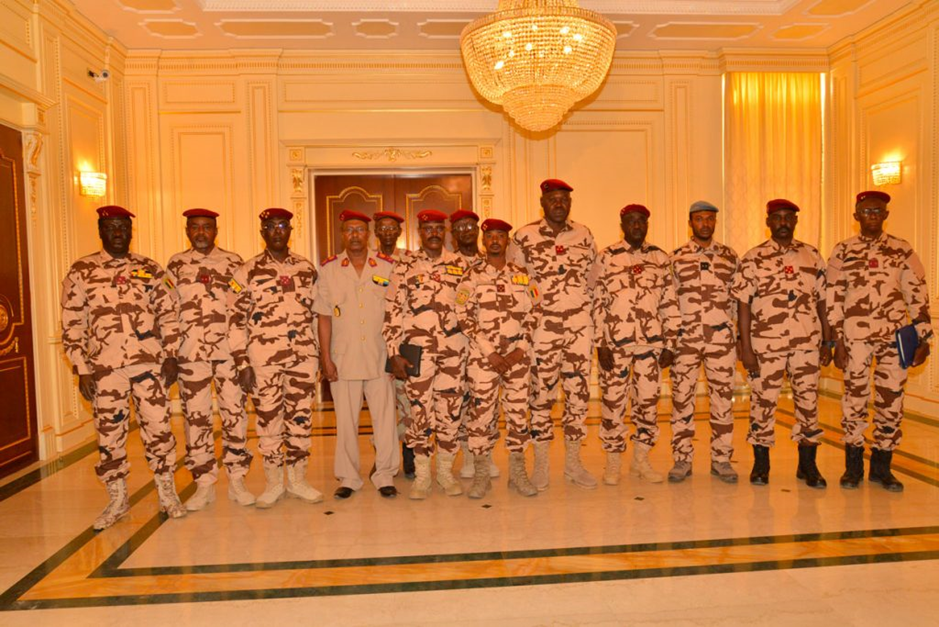Chad Between Sub-Regional Instability and Diplomatic Crisis
- Koche Adam Mahamat Ali
- 21 Haz 2023
- 5 dakikada okunur
Chad, a country located in the heart of Africa, faces complex and interconnected challenges related to sub-regional instability and diplomatic crisis. The landlocked nation is surrounded by fragile and conflict-ridden countries, which has direct consequences for its own internal stability. In addition, Chad faces diplomatic tensions with some of its neighbors and other regional actors. This situation presents significant challenges for Chad, as it affects its security, economic development, and international relations. In this in-depth analysis, we will examine the causes and consequences of this dual problem, highlighting the key issues facing Chad. Chad is located in a region characterized by persistent subregional instability. Neighboring countries such as Sudan, Libya, Central African Republic, and Niger have all been affected by armed conflict, ethnic and religious tensions, and rebel movements. These regional crises have a direct impact on Chad, which shares porous borders with these countries. Rebel groups, arms traffickers, and criminal gangs take advantage of these conflict zones to operate across borders, threatening Chad's internal security and stability. This sub-regional instability fuels a vicious cycle of violence, mass displacement, and insecurity, creating an environment conducive to the emergence of extremist groups and the perpetuation of conflict.

In addition to this sub-regional instability, Chad is facing diplomatic crises with some of its neighbors and other regional actors. Political rivalries, territorial disputes, economic disputes, and ethnic tensions can lead to diplomatic confrontations and a deterioration of international relations. Border disputes, particularly with Libya and Sudan, have been a constant source of friction and tension for Chad. Economic interests, such as control of natural resources and trade routes, can also contribute to the deterioration of diplomatic relations between countries.
A Transition that is Too Turbulent
Two years after the tragic death of Chad's Marechal IDRISS DEBY ITNO, the country finds itself in a harsh political and economic situation; between the probability of a social implosion caused by a potential risk of sub-regional destabilization at its extremities, driven by the persistence of the Libyan crisis in the North, the Sudanese crisis in the East and the diplomatic incident with neighboring Cameroon. This list, far from being exhaustive, demonstrates the conditions in which the Chadian political and institutional climate is evolving.

Since April 20, 2021, Chad has been in a period of transition following the emotional death of the incumbent president, who had just won the presidential elections for a fifth consecutive term. The constitution and the National Assembly were dissolved, leaving room for the Military Transitional Council headed by his son, General MAHAMAT IDRISS DEBY ITNO. Two years later, Chad is facing an unprecedented political and diplomatic turmoil.
Cameroon: A Strategic Neighbor Above All
First, Chadian authorities announced the recall of the Chadian ambassador resident in Yaoundé for consultation. The main reason for the recall is that in December 2022, the U.S. company Exxon Mobil, which transports Chadian crude oil to Kiribi (Cameroon), announced that its shares would be bought out by a British company, Savannah Midstream Investment Limited (SMIL), based in the Bahamas. However, Chad formally opposes and expresses reservations about this operation, which it considers risky and illegal, because it was not consulted and therefore contrary to the conventions and statutes of COTCO; otherwise, the operation would be null and void. For Chad, the acquiring company does not have the technical and financial capacities, nor sufficient guarantees, given that oil is a strategic resource and represents alone more than 80% of the country's revenues.

What hurts Chad even more, according to sources in the presidency, the Chadian authorities learned through the press on April 20, 2023, the signing of an agreement providing for the transfer by a subsidiary of Savannah Energy PLC of 10% of the share capital of COTCO to the Société Nationale des Hydrocarbures (SNH) of Cameroon. In other words, Cameroon has acted in collusion with the Company that Chad vigorously rejects by buying back 10% of its shares, for an amount of 44.9 million dollars, which is roughly equivalent to 26 billion FCFA. What the Chadian authorities still blame their colleagues is that after several correspondences and official reminders, the Cameroonian authorities have remained silent after being informed of all these unfriendly actions towards Chad. This is an unfriendly and discourteous attitude that the Minister Secretary General of the Presidency of Chad has made known.

The Chadian-Libyan Border: A Multiple Challenge Zone
In addition to the diplomatic tension with Cameroon, the ongoing Libyan crisis continues to fuel border conflicts between armed groups, various traffickers and illegal gold miners. Indeed, the land border separating the two countries is 1,055 km long and remains a hotbed of tension and a theater of confrontation between terrorism, the presence of various armed rebel factions, and government forces, due to recurrent incursions into Chadian territory. Illegal gold panning in this area also leads to violent clashes between Chadian communities in the area, often resulting in the loss of several lives. Since the Libyan crisis has allowed traffickers and various criminals to bring in sophisticated weapons at rock-bottom prices, providing them with priceless profits. This uncontrolled trafficking has allowed terrorist movements and various armed groups to fill their garrisons with weapons, and to organize targeted attacks against the positions of the regular army, thus weakening its ability to respond. This is what led to the death of Marechal DEBY, by a rebel group called the “Front for Change and Concord in Chad” (FACT-Front pour l'Alternance et la Concorde au Tchad), making the Libyan border its rear base.

Himedti-Bourhan Escalation in Khartoum: A Growing Concern for N'Djamena?
In the same vein, the recent Sudanese crisis could become a source of destabilization and insecurity in Chad. Since the first armed uprisings against the Tombalbay regime, which led to the creation of the Front de Libération du Tchad (FROLINAT) in 1962, all the political-military tendencies without exception that have come to power have had the Sudanese border as their rear base. It is from there that they train their troops, plan and organize their modus operandi. This area is the focal point for destabilizing the regime in N'Djamena, because the succession to power has always been by force of arms. Indeed, the commander of the Rapid Support Force (RSF), General Mahamat Hamdan Dagalo, alias Himedti, is said to be Chadian, and the majority of his troops come from Darfur, the border area of Chad. Since the communities residing in this area share an ethnic and cultural homogeneity. This leads some researchers to assert that the majority of the RSF's fighters are Chadian. Consequently, in order to ensure the continuity of the Chadian regime, the Sudanese neighbor must have lasted, even permanent, political instability, in order to ensure the security of its borders, thus stifling any form of birth or shelter on its soil of armed movements hostile to the power in N'Djamena. This is what the Chadian authorities want. From an economic point of view, trade between the two countries is considerable, given that political instability in Sudan would probably cause a break in trade, impacting the lifestyle of citizens in eastern Chad, since they are largely dependent on manufactured goods from Sudan.

In order to put an end to this crisis, the Chadian government continues to play the role of mediator between the two belligerents, because it is in the interest of both countries, since the stability of one is a guarantee of the stability of the other.
Conclusion
In conclusion, Chad faces a complex and interconnected challenge, resulting from both persistent subregional instability and diplomatic crises. Chad's internal stability is closely linked to the stability of the region as a whole. To mitigate these problems, it is crucial that Chad strengthen its national security capabilities, with a focus on combating rebel groups and cross-border criminal networks. In addition, the country must also seek to resolve diplomatic disputes through peaceful negotiations, proactive diplomacy, and regional mediation. Promoting regional cooperation and finding common solutions to subregional challenges can contribute to the stability and sustainable development of Chad and its neighbors. Finally, the support of the international community is essential to help Chad address these challenges and pave the way for a more peaceful and prosperous future for the entire region.










Yorumlar